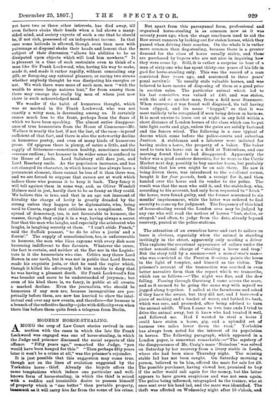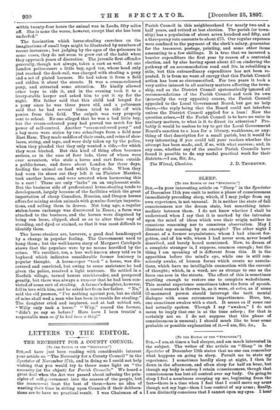MODERN HORSE-STEALING-.
AMONG the crop of Law Court stories revived in con- nection with the cases in which the late Sir Frank Lockwood was engaged was one of horse-stealing, in which the Judge and prisoner discussed the social aspects of this offence. "Fifty years ago," remarked the Judge, "you would have been hanged for this." "Then perhaps fifty years later it won't be a crime at all," was the prisoner's rejoinder.
It is jest possible that this suggestion may come true, though not on the lines of evolution suggested by the Yorkshire horse - thief. Already the bicycle offers the same temptations which induce one particular and well- known form of horse-stealing, in which the thief is seized with a sudden and irresistible desire to possess himself of property which is "one better" than portable property, inasmuch as it will carry him, far from the scene of his crime.
Bat apart from this paroxysmal form, professional and organised horse-stealing is as common now as it was seventy years ago, when the stage coachmen used to aid the Bow street runners by looking out for stolen horses, which they passed when driving their coaches. On the whole it is rather more common than dog-stealing, because there is a greater demand for the class of horse usually stolen, and these are purchased by buyers who are not nice in inquiring how they were come by. Still, it is rather a surprise to hear of a man of sixty-one who has spent thirty-one years of his life in gaol for horse-stealing only. This was the record of a man convicted four -'ears ago, and sentenced to three years' penal servitui.c He usually stole valuable horses, and was believed to have means of disposing of them at a good price in auction sales. The particular animal which led to his last conviction was valued at £40, and was stolen,
with the aid another man, from a field near Stanmore. When recovered it was found well disguised, its tail having been clipped, and its mane " hogged," so that it was most unlikely to be recognised if seen being driven in harness. It is most unwise to leave out at night in any field within a short distance of London horses of the class which can be put into light carts and gigs, unless the gates are solidly fastened and the fences wired. The following is a case typical of dozens which come before the police-courts and suburban Justices. A stableman and a labourer were indicted for having stolen a horse, the property of a baker. The baker used to turn his horse out in a field at Tottenham, and one morning found that it had disappeared. Apparently the baker was a good amateur detective, for he went to the Cattle Market next day, possibly to buy another horse, but probably thinking that his own might be on sale there. He saw it being driven there, was introduced to the soi•disant owner, bought it for four pounds, took a receipt for it, and then handed over the horse and its vendor to the police. The result was that the man who sold it, and the stable-boy, who, according to his account, had only been requested to " fetch " the horse, were found guilty, and the former sentenced to six months' imprisonment, while the latter was ordered to find security to come up for judgment. The frequency cf this kind of horse-stealing round the London area may be judged by any one who will read the notices of horses " lost, stolen, or strayed," and often, to judge from the date, already beyond recovery, posted at the police-stations.
The attraction of an ownerless horse and cart to sailors on leave is obvious, especially when the animal is standing invitingly in the street, apparently only needing a driver This explains the occasional appearance of sailors under the rather sensational charge of "stealing a horse and trap.' But the story told by a seaman—not a man-o'-war's man— who was convicted at the Preston Sessions paints the horse in the light of tempter, and himself as the victim. The prisoner's account of the transaction was couched in even better narrative form than the report which we transcribe, which ran as follows :—" The night was fine, and the dew falling. Passing through Garstang I came across the mare, and as it seemed to be going the same way with myself we jogged along together. I called at the farmhouse and asked if they knew the owner, but they did not, and I borrowed a piece of sacking and a bucket of water, and bathed its back, which was sore, and proceeded, after being advised to turn the animal adrift. When I came to two lane ends I tried to drive the animal away, but it knew who had treated it well, and followed me. Had I wanted to steal a horse I could have stolen a horse, gig, and a splendid set of harness two miles lower down the road." Yorkshire has always been noted for the interest of its population in horses. The following paragraph, which appeared in a London paper, is somewhat remarkable :—" The mystery of the disappearance of Mr. Craig's mare 'Noiseless' was solved on Saturday by her recovery from a livery stable in Leeds, where she had been since Thursday night. The missing stable lad has not been caught. On Saturday morning a person, believed to be him, offered the mare for sale for £8. The possible purchaser, having viewed her, promised to buy if the seller would call again for the money, but the latter appears to have grown suspicious and was not seen again. The police being informed, telegraphed to the trainer, who at once sent over his head lad, and the mare was identified. The theft was effected on Wednesday night after 10 o'clock, an
• within twenty-four hours the animal was in Leeds, fifty miles off. She is none the worse, however, except that she has been underfed."
The fascination which horse-stealing exercises on the imaginations of small boys might be illustrated by numbers of recent instances ; but judging by the ages of the prisoners in some cases, they do not seem to grow out of the habit when they approach years of discretion. The juvenile first offender generally, though not always, takes a cart as well. At one London police-court a little boy, aged ten, whose head only just reached the dock-rail, was charged with stealing a pony and a set of plated harness. He had taken it from a field and ridden it about the streets. It was a cream-coloured pony, and attracted some attention. He kindly allowed other boys to ride it, and in the evening took it to a livery-stable keeper and asked him to put it up for the night. His father said that this child had longed for a pony since he was three years old, and a policeman said that he had several times tried to ride off with ponies from this field. The culprit was very properly sent to schooL No one alleged that he was a bad little boy, but the cream-coloured pony had proved too much for his power of self-control. Another "cream-coloured pony" and a bay mare were stolen by two schoolboys from a field near East Ham. They made saddles of their coats, and reins of shoe- laces, string, and tape, and were duly taken up by the police, when they pleaded that they only wanted a ride,—for which they were birched. But this kind of thing often becomes serious, as in the case of four lads, three of whom were over seventeen, who stole a horse and cart from outside a public-house, and drove about London for three days, feeding the animal on food which they stole. When they had worn its shoes out they left it on Plaistow Marshes, took another horse, and were arrested when harnessing this to a cart ! These are only "larks" on an unpleasant scale. But the business side of professional horse-stealing tends to development, largely because of the facilities which the great importation of cheap Canadian, Russian, and Oregon horses offers for mixing stolen animals with genuine foreign importa- tions. and selling them in droves. Not long ago, a regular stolen-horse exchange was discovered in Essex; a farm was attached to the business, and the horses were disguised by being run loose, clipped, shod so as to alter their way of standing, and dyed or stained, so that it was most difficult to identify them.
The horse-stealers are, however, a good deal handicapped by a change in popular feeling. The Government used to hang them ; but the well-known story of Margaret Catchpole shows that the populace were by no means horrified by the crime. We recollect, too, a less well-known story told us in boyhood which indicates considerable former leniency in popular thought. A horse-toper "took " a horse, was dis- covered and convicted, but owing to some assistance he had given the police, received a light sentence. He settled in a Norfolk village, turned honest stockbreeder, and prospered greatly, but there was always a rumour that he had been con- victed of some sort of stealing. A farmer's daughter, however, fell in love with him, and he asked her from her father. "No," said the old yeoman, " I've nothing against you, but no child of mine shall wed a man who has been in trouble for stealing." The daughter cried and implored, and at last sobbed out, "Willy only took a horse." " Why," roared the farmer, "didn't ye say so before ? Here have I been treatin' a respectable man as if he had been a thief."



































 Previous page
Previous page